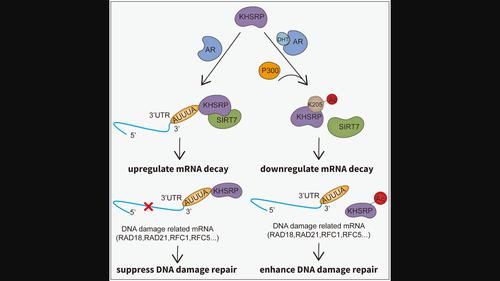当前位置:
X-MOL 学术
›
Mol. Oncol.
›
论文详情
Our official English website, www.x-mol.net, welcomes your feedback! (Note: you will need to create a separate account there.)
Acetylated KHSRP impairs DNA‐damage‐response‐related mRNA decay and facilitates prostate cancer tumorigenesis
Molecular Oncology ( IF 6.6 ) Pub Date : 2024-03-19 , DOI: 10.1002/1878-0261.13634 Haihua Yuan 1, 2 , Renjie Cai 1, 2 , Biying Chen 1, 2 , Qian Wang 1, 2 , Mengting Wang 1 , Junyi An 1 , Weishu An 1 , Ye Tao 1, 2 , Jianxiu Yu 3 , Bin Jiang 1 , Yanjie Zhang 1, 2 , Ming Xu 1, 2
Molecular Oncology ( IF 6.6 ) Pub Date : 2024-03-19 , DOI: 10.1002/1878-0261.13634 Haihua Yuan 1, 2 , Renjie Cai 1, 2 , Biying Chen 1, 2 , Qian Wang 1, 2 , Mengting Wang 1 , Junyi An 1 , Weishu An 1 , Ye Tao 1, 2 , Jianxiu Yu 3 , Bin Jiang 1 , Yanjie Zhang 1, 2 , Ming Xu 1, 2
Affiliation

|
Androgen‐regulated DNA damage response (DDR) is one of the essential mechanisms in prostate cancer (PCa), a hormone‐sensitive disease. The heterogeneous nuclear ribonucleoprotein K (hnRNPK)‐homology splicing regulatory protein known as far upstream element‐binding protein 2 (KHSRP) is an RNA‐binding protein that can attach to AU‐rich elements in the 3′ untranslated region (3′‐UTR) of messenger RNAs (mRNAs) to mediate mRNA decay and emerges as a critical regulator in the DDR to preserve genome integrity. Nevertheless, how KHSRP responds to androgen‐regulated DDR in PCa development remains unclear. This study found that androgen can significantly induce acetylation of KHSRP, which intrinsically drives tumor growth in xenografted mice. Moreover, enhanced KHSRP acetylation upon androgen stimuli impedes KHSRP‐regulated DDR gene expression, as seen by analyzing RNA sequencing (RNA‐seq) and Gene Set Enrichment Analysis (GSEA) datasets. Additionally, NAD‐dependent protein deacetylase sirtuin‐7 (SIRT7) is a promising deacetylase of KHSRP, and androgen stimuli impairs its interaction with KHSRP to sustain the increased KHSRP acetylation level in PCa. We first report the acetylation of KHSRP induced by androgen, which interrupts the KHSRP‐regulated mRNA decay of the DDR‐related genes to promote the tumorigenesis of PCa. This study provides insight into KHSRP biology and potential therapeutic strategies for PCa treatment, particularly that of castration‐resistant PCa.
中文翻译:

乙酰化 KHSRP 损害 DNA 损伤反应相关 mRNA 衰减并促进前列腺癌肿瘤发生
雄激素调节的 DNA 损伤反应 (DDR) 是前列腺癌 (PCa) 这种激素敏感性疾病的基本机制之一。异源核核糖核蛋白 K (hnRNPK) 同源剪接调节蛋白被称为远上游元件结合蛋白 2 (KHSRP),是一种 RNA 结合蛋白,可以附着在 3' 非翻译区 (3'-UTR) 中富含 AU 的元件上。 ) 的信使 RNA (mRNA) 介导 mRNA 衰减,并成为 DDR 中保持基因组完整性的关键调节因子。然而,KHSRP 在 PCa 发育过程中如何响应雄激素调节的 DDR 仍不清楚。这项研究发现,雄激素可以显着诱导 KHSRP 乙酰化,从而从本质上驱动异种移植小鼠的肿瘤生长。此外,通过分析 RNA 测序 (RNA-seq) 和基因集富集分析 (GSEA) 数据集可以看出,雄激素刺激下 KHSRP 乙酰化增强会阻碍 KHSRP 调节的 DDR 基因表达。此外,NAD 依赖性蛋白脱乙酰酶 Sirtuin-7 (SIRT7) 是一种有前途的 KHSRP 脱乙酰酶,雄激素刺激会损害其与 KHSRP 的相互作用,从而维持 PCa 中增加的 KHSRP 乙酰化水平。我们首先报道了雄激素诱导的 KHSRP 乙酰化,它中断了 KHSRP 调节的 DDR 相关基因的 mRNA 衰减,从而促进 PCa 的肿瘤发生。这项研究深入了解了 KHSRP 生物学和 PCa 治疗的潜在治疗策略,特别是去势抵抗性 PCa。
更新日期:2024-03-19
中文翻译:

乙酰化 KHSRP 损害 DNA 损伤反应相关 mRNA 衰减并促进前列腺癌肿瘤发生
雄激素调节的 DNA 损伤反应 (DDR) 是前列腺癌 (PCa) 这种激素敏感性疾病的基本机制之一。异源核核糖核蛋白 K (hnRNPK) 同源剪接调节蛋白被称为远上游元件结合蛋白 2 (KHSRP),是一种 RNA 结合蛋白,可以附着在 3' 非翻译区 (3'-UTR) 中富含 AU 的元件上。 ) 的信使 RNA (mRNA) 介导 mRNA 衰减,并成为 DDR 中保持基因组完整性的关键调节因子。然而,KHSRP 在 PCa 发育过程中如何响应雄激素调节的 DDR 仍不清楚。这项研究发现,雄激素可以显着诱导 KHSRP 乙酰化,从而从本质上驱动异种移植小鼠的肿瘤生长。此外,通过分析 RNA 测序 (RNA-seq) 和基因集富集分析 (GSEA) 数据集可以看出,雄激素刺激下 KHSRP 乙酰化增强会阻碍 KHSRP 调节的 DDR 基因表达。此外,NAD 依赖性蛋白脱乙酰酶 Sirtuin-7 (SIRT7) 是一种有前途的 KHSRP 脱乙酰酶,雄激素刺激会损害其与 KHSRP 的相互作用,从而维持 PCa 中增加的 KHSRP 乙酰化水平。我们首先报道了雄激素诱导的 KHSRP 乙酰化,它中断了 KHSRP 调节的 DDR 相关基因的 mRNA 衰减,从而促进 PCa 的肿瘤发生。这项研究深入了解了 KHSRP 生物学和 PCa 治疗的潜在治疗策略,特别是去势抵抗性 PCa。



























 京公网安备 11010802027423号
京公网安备 11010802027423号